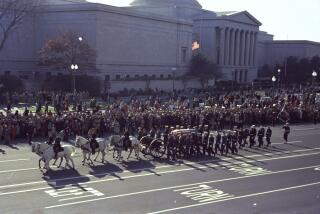In Dallas the Words Just Came
- Share via
Why do the traumas of life--the wrenching moments--surface so often, years after they have passed? I still get chills thinking of that day in Dallas--Nov. 22, 1963.
I was part of that motorcade. I agonized through the hours as we waited at Parkland Hospital. After President Kennedy’s death was announced, we raced across Dallas in a police car, only vaguely aware that while we had come with the vice president, we were returning to Washington with the President.
L.B.J. would have to say something to the nation on arrival in Washington. I was one of the few writers on hand. In my purse were some gold-edged cards with small embossed birds I had carried to have handy for Lady Bird for autographing. It was all I had, and on one card, I scrawled the most important piece of prose I ever wrote--the 58 words that L.B.J. used a few hours later when Air Force One arrived at Andrews Air Force Base:
“This is a sad time for all people. We have suffered a loss that cannot be weighed. For me, it is a deep personal tragedy. I know that the world shares the sorrow that Mrs. Kennedy and her family bear. I will do my best. That is all I can do. I ask for your help--and God’s.”
How did those words come in that awful moment, words I truly believe were handed to me by an unseen hand? But they came. And they were right. Most of us aboard the plane walked about as in a trance. Bill Moyers tells me that L.B.J. looked at me and said, “Write something for me to say, Liz.” L.B.J. and I had both anticipated what was needed.
I went back to my seat and printed the words out on another card from the barely legible scrawl on the one in my purse, then handed them to Bill. Either he or the President changed the order of two words. I had written “God’s help and yours,” and one of them changed it.
I still remember the ride home, so silent, so tension-filled, everyone trying to do the right thing under such dreadful circumstances. The President was sworn in. I backed into the plane’s cabin, having no desire to crowd up front, ashamed of my country, ashamed of Dallas. I remember having arranged it so the White House photographer, Cecil Stoughton, could take the historic picture. Like me, like so many on that plane, he moved automatically to do what his job required him to do.
“He isn’t going to like this,” Cecil said to me quietly, nodding toward L.B.J., “but if there is a swearing-in on this plane, it is my job to photograph it for history.”
I went to L.B.J. He nodded, and the photograph was taken. It seemed that we were there so suddenly, on a new stage, in a new role, and, finally, in the helicopter on the way to the White House lawn that November night.
“Stay with Lady Bird and help her all you can,” L.B.J. said. He went into session with the Cabinet and congressional leaders he had summoned by phone from the plane. Lady Bird and I rode in the vice-presidential limousine to their home, a dozen blocks from my own house. A million thoughts raced through my mind. Both of us were well aware of the difficult days ahead--made even more difficult because this tragedy had occurred in our home state. Finally, in the silence of the limousine, we talked.
“It seems a terrible thing to say, but the salvation of Texas is that the governor was hit,” I said.
She replied: “Don’t think I haven’t thought of that. I only wish it could have been me.”
It did not occur to me then, though I think of it now as I look back on the span of presidents from F.D.R. to J.F.K., but we live every moment with uncertainty when a single second can change everything: our role, our country. One person can make a difference.
These are lessons to which our ancestors--the “ancients” in this relatively young America--speak.
Excerpted from “Getting Better All the Time,” by Liz Carpenter. Copyright 1987 by Liz Carpenter. Reprinted by permission of the publisher, Simon & Schuster Inc.
More to Read
Sign up for Essential California
The most important California stories and recommendations in your inbox every morning.
You may occasionally receive promotional content from the Los Angeles Times.













